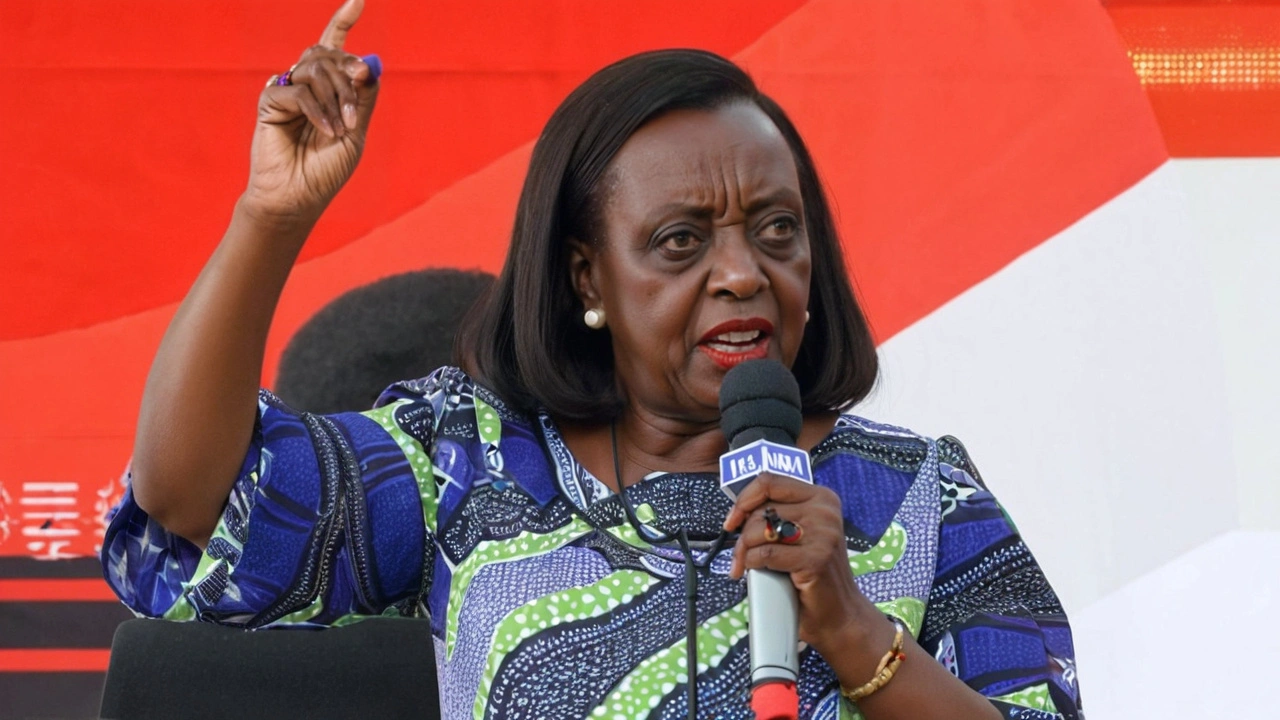Martha Karua's Narc-Kenya Party Announces Departure from Azimio la Umoja Coalition Amid Political Turbulence

Martha Karua's Narc-Kenya Party Announces Departure from Azimio la Umoja Coalition Amid Political Turbulence
Martha Karua's Narc-Kenya party has officially declared its intention to leave the Azimio la Umoja One Kenya coalition, a significant shift in Kenya's political landscape. The decision was announced amid rising tensions within the coalition, particularly after President William Ruto nominated four ODM party leaders to Cabinet positions. These leaders—John Mbadi, Opiyo Wandayi, Wycliffe Oparanya, and Ali Hassan Joho—have accepted the roles, intensifying the ongoing political feud.
The Narc-Kenya party's Acting Secretary General, Asha Bashir, cited 'prevailing political developments' as the primary reason for this decisive move. According to Bashir, these developments have made it clear that remaining part of the coalition is no longer in the party's best interest. This announcement is a critical blow to the Azimio coalition, which has been grappling with internal divisions and mounting tensions for some time.
Karua, who stood as Raila Odinga's running mate during the 2022 presidential election, was perceived as a potential successor to take over the leadership of the Azimio coalition. This possibility seemed to gain traction, especially if Odinga's bid to chair the African Union Commission proved successful. However, the current political dynamics have significantly altered the trajectory for Karua and her party.
The exit notice from Narc-Kenya is set to take immediate effect but will comply with the three-month notice requirement stipulated by the coalition agreement. This timeframe allows other member parties to prepare for the impending changes. The reaction from other Azimio coalition members has been varied. Parties such as Wiper, Jubilee, DAP-K, and PNU have openly denied any plans to join the government, positioning themselves as steadfast in opposition to the current administration.
Implications for the Azimio Coalition
The departure of Narc-Kenya is more than just a symbolic setback for the Azimio coalition; it underscores the fragile nature of political alliances in Kenya. The coalition was formed with the intent of providing a robust opposition to the ruling party, yet it has been marred by internal strife and differing visions among its members. The recent nominations by President Ruto have heightened these tensions, leading to accusations of attempts to weaken the opposition by absorbing prominent leaders into governmental roles.
Several political analysts argue that this move by President Ruto is strategic, aiming to dismantle the opposition by co-opting its key figures. This tactic not only strengthens his own political base but also creates discord within the opposition ranks, making it more challenging for them to present a united front. The ripple effects of this strategy are already visible, as demonstrated by Narc-Kenya's departure.
For Martha Karua, the exit from the Azimio coalition opens a new chapter in her political journey. Known for her principled stand on various issues and uncompromising integrity, Karua has always been a prominent figure in Kenyan politics. Her decision to pull out of the coalition could be driven by a desire to preserve her political ideals and maintain an independent course amid the shifting alliances and political maneuvering.
Reactions and Future Prospects
The announcement has elicited a wide range of reactions from political players and the public alike. Supporters of Narc-Kenya have praised the move, viewing it as a step towards reclaiming the party's autonomy and political integrity. On the other hand, some critics see it as a weakening of the opposition's collective strength, potentially giving the ruling party an upper hand.
The future of the Azimio la Umoja coalition now hangs in the balance. Its ability to remain a formidable force in Kenyan politics is contingent upon its members' capacity to navigate these internal challenges and present a cohesive strategy moving forward. The leadership vacuum left by Narc-Kenya's exit will need to be addressed swiftly to prevent further fragmentation.
Political watchers will be keenly observing the next steps taken by both Narc-Kenya and the remaining members of the Azimio coalition. The evolving dynamics will likely shape the political discourse in Kenya for the foreseeable future. Whether this marks the beginning of the end for the coalition or a transformative period of realignment remains to be seen.

Conclusion
The decision by Martha Karua's Narc-Kenya party to exit the Azimio la Umoja coalition is a pivotal moment in Kenya's political narrative. It highlights the complexities and volatility inherent in political alliances, particularly within the context of Kenyan politics. The move has significant implications for the opposition's structure and effectiveness, as well as for Karua's political career.
As the political landscape continues to evolve, stakeholders within and outside the Azimio coalition will need to adapt to the changing dynamics. The next few months will be crucial in determining the coalition's future and the broader implications for Kenya's political landscape. With heightened scrutiny and various strategic interests at play, the coming period promises to be a defining chapter in Kenyan politics.
The dissolution of the Narc‑Kenya alliance illustrates a calculated response to shifting power dynamics.
It underscores the coalition's vulnerability to executive co‑optation.
In the theater of Kenyan politics, the exit of Narc‑Kenya reads like a soliloquy of disillusioned idealism.
Karua, once the beacon of uncompromising integrity, now stands at a crossroads where principle meets pragmatism.
The coalition, a mosaic of competing ambitions, fractures under the weight of Ruto's strategic appointments.
Each nomination is a blade, cutting the delicate fabric of opposition unity.
Observers whisper that the president's hand reaches beyond mere governance, seeking to rewrite the very script of dissent.
Such maneuvers echo ancient tales where the powerful invite the adversary to the banquet, only to bind them with invisible chains.
Yet the people, ever watchful, see through the theater's smoke and mirrors.
They recognize that a party's departure is not merely a tactical retreat but a moral statement.
The very act of leaving signals that the coalition no longer mirrors the aspirations of its constituents.
It also reflects Karua's steadfast refusal to be subsumed by a larger entity that may dilute her vision.
In this volatile moment, the balance of power tilts, and new alliances may emerge from the ashes of the old.
Political architects will scramble to rebuild a front that can withstand future incursions.
Meanwhile, the electorate grapples with fatigue, yearning for genuine representation rather than perpetual politicking.
The departure may well catalyze a rejuvenation of civil discourse, if leaders choose authenticity over opportunism.
Only time will reveal whether this rupture becomes a catalyst for renewal or a prelude to further disarray.
Yo, yall gotta understand that Karua's move is more than drama-it's a call to the rest of the opposition to stop playin' nice and start standin' up.
We can't just sit back while the gov tries to eat us up, we need real unity, not just empty promises.
So let's rally, share facts, and make sure the next elections reflect the people's true voice.
Wow! This is a massive shift, and it's electrifying to see leaders stepping up for what they truly believe.
Karua's decision sparks a fresh wave of hope that integrity can still thrive in the political arena.
Let's keep the momentum going and support parties that champion real change!
Oh great, another coalition crumbles because someone thought a few cabinet seats were worth the drama.
Guess we should all just sit back and enjoy the endless political soap opera.
At least it's never boring.
The recent schism within the Azimio alignment epitomizes the perennial tension between ideological fidelity and expedient governance.
Such developments warrant a measured contemplation of the underlying structural deficiencies that perpetuate factional volatility.
I appreciate the candor displayed by Narc‑Kenya in articulating their departure.
It is essential for political entities to maintain clear boundaries when core principles are at stake.
Moving forward, constructive dialogue will be pivotal in reshaping a resilient opposition.
Larry, I see your point, but consider revising "yall" to "you all" for clarity.
The sentiment remains powerful, and the call for unity is well‑placed.
i think this whole thing is just a big drama pshow.
Jordan, you nailed the core issue-political fragmentation really does expose vulnerability.
Hope we can see a stronger, more cohesive opposition soon.
Maybe the coalition's breakup is actually a strategic advantage for the ruling party's agenda.
Wake up, everyone! This so‑called “political maneuver” is nothing but a staged distraction orchestrated by shadow networks embedded within the government.
They want us divided so they can push their hidden agenda without scrutiny.
Don't be fooled by the surface drama; the real battle is against the deep‑state puppeteers pulling the strings behind every appointment and alliance.
Stay vigilant.